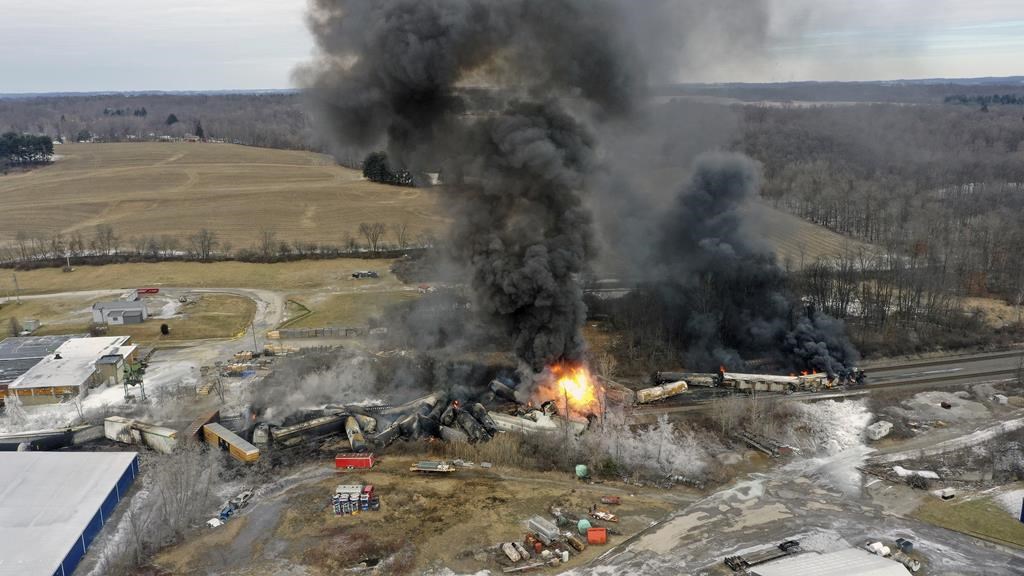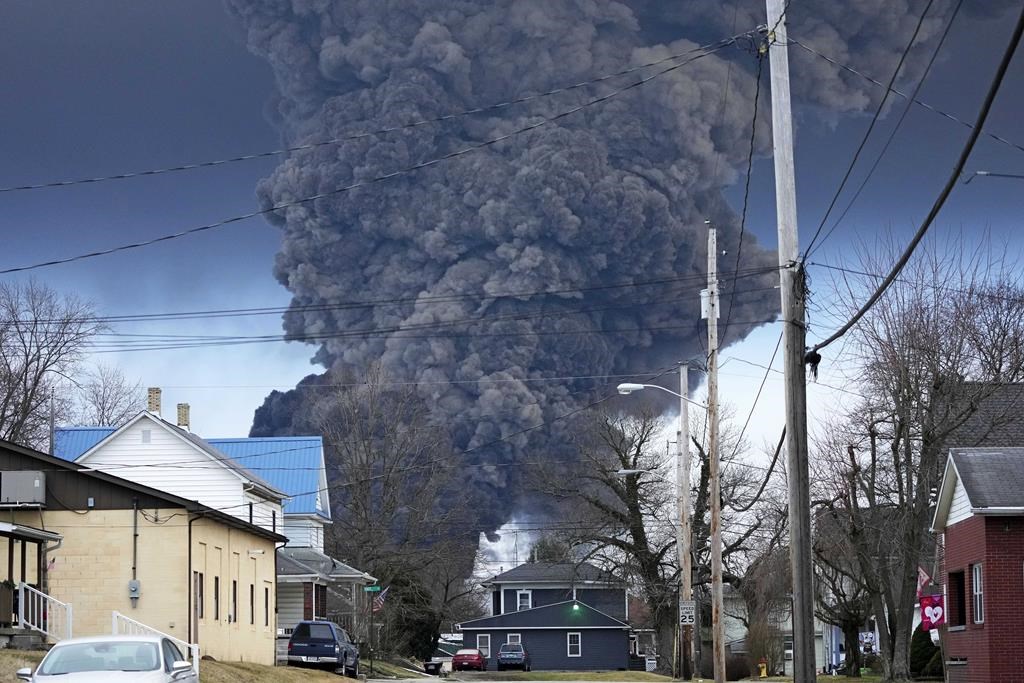Over a year after a Norfolk Southern train derailed and spewed toxic chemicals into East Palestine, Ohio, the freight company has agreed to pay a settlement of more than US$310 million (over C$425.6 million).

The U.S. federal government announced the settlement on Thursday, with Norfolk Southern set to pay a US$15 million (about C$20.5 million) civil penalty, as well as other additional costs to do with cleanup and health care.
The Department of Justice and the Environmental Protection Agency (EPA) said the settlement still has to be approved by a federal court, the New York Times reported.
On Feb. 3, 2023, a 38-car Norfolk Southern cargo train, which was carrying some hazardous chemicals, ran off the rails in the small town of East Palestine. Emergency crews eventually drained the hazardous materials, including the known carcinogen vinyl chloride, into a trench for a controlled burn. The burn sent a massive black plume of phosgene gas and hydrogen chloride into the air.
The town was temporarily evacuated, but many residents in East Palestine and the surrounding area still have concerns for the safety of the environment and their own health and wellness. Last year, reports of dead animals and lingering dioxins in the region made locals especially antsy.

Get daily National news
The newly announced settlement will require Norfolk Southern to improve safety to prevent derailments, as well as pay for cleanup costs and health and environmental monitoring in and around East Palestine.
Residents who were forced to evacuate their homes after the derailment were generally underwhelmed by the deal, which doesn’t include any criminal charges.
“Honestly, no amount can ever make this right, but it should be at least enough to hurt them a little bit. I’m sure that’s not going to hurt their bottom line at all,” East Palestine resident Jami Wallace told the Associated Press.

In addition to the US$15 million civil penalty, Norfolk Southern agreed to reimburse the EPA an additional US$57 million (over C$78 million) in response costs and set up a US$25 million (around C$34 million) health care fund to pay for 20 years of medical exams in the community. The railroad will also pay up to US$30 million (nearly C$41 million) for long-term monitoring of drinking water and groundwater.
The New York Times estimated the total costs relating to environmental cleanup — the largest portion of the settlement amount — will reach an estimated US$235 million (about C$32 million).
On Tuesday, a federal judge signed off on the railroad’s US$600 million (roughly C$823.8 million) class-action settlement with residents whose lives were disrupted. Overall, Norfolk Southern anticipates paying about US$1.7 billion (over C$2.3 billion) in total costs related to the derailment, including the US$600 million settlement.
Alan H. Shaw, the chief executive of Norfolk Southern, said the company is satisfied with the settlement.
“We are pleased we were able to reach a timely resolution of these investigations that recognizes our comprehensive response to the community’s needs and our mission to be the gold standard of safety in the rail industry,” Shaw said in a statement.
EPA Administrator Michael Regan said the US$15 million civil fine is the largest allowed under the Clean Water Act, which Norfolk Southern was found to have violated.
Norfolk Southern has said their train derailed due to an overheated wheel bearing.
Among the safety improvements promised by Norfolk Southern is a vow to add about 200 more trackside detectors to spot overheating bearings. The company also promised to invest in more than a dozen advanced inspection portals that use an array of cameras to take hundreds of pictures of every passing railcar.
In the fourth quarter of 2023, Norfolk Southern reported a US$527 million (more than C$723.5 million) profit.
A bill in Congress that would require Norfolk Southern and the rest of the major freight railroads to make more significant changes has stalled. These changes include implementing detectors for hot bearings, like those 200 Norfolk Southern has promised.
— With files from the Associated Press









Comments
Want to discuss? Please read our Commenting Policy first.